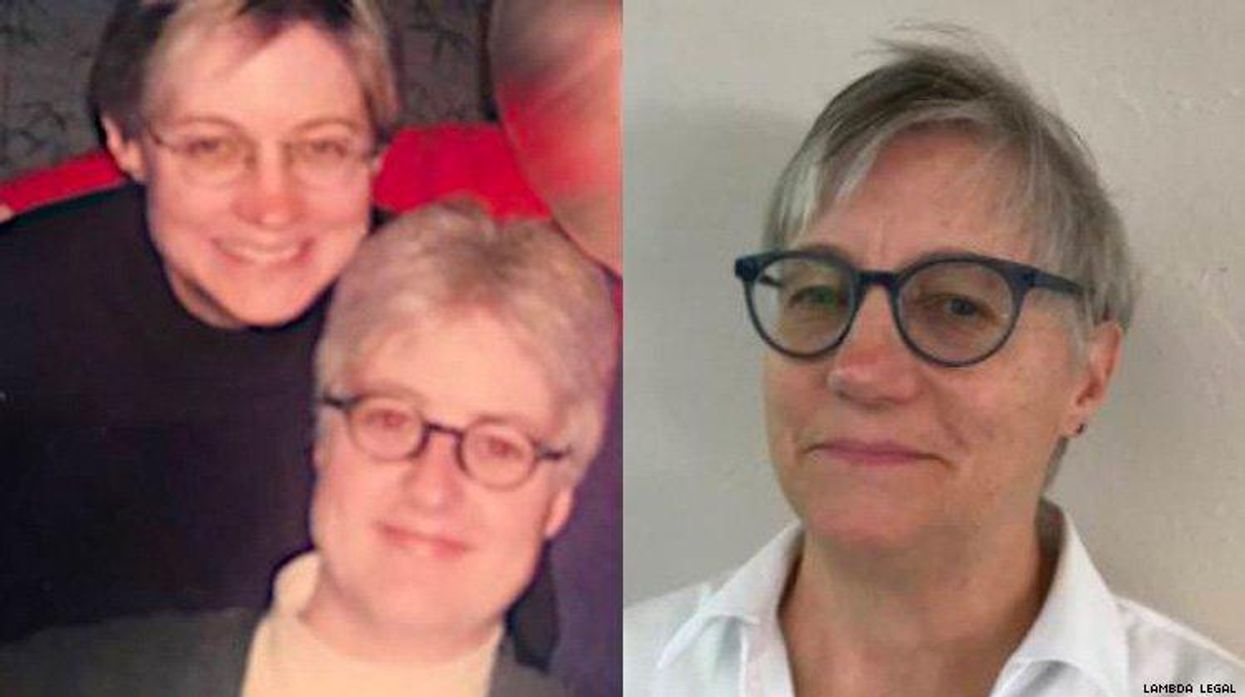Pictured: Helen Thornton (at right) and at left with her partner, Marge Brown
Same-sex spouses who were ineligible for Social Security survivor's benefits because of discriminatory marriage laws can now receive them, thanks to court decisions and the federal government's withdrawal of its appeals of those rulings.
The Social Security Administration and the Department of Justice announced Monday that they were ending the appeals. U.S. district courts in Arizona and Washington State ruled last year that denial of the benefits was unconstitutional, but the government agencies, under Donald Trump's administration, appealed to the U.S. Court of Appeals for the Ninth Circuit. Now, under President Joe Biden, the agencies have withdrawn the appeals.
Lambda Legal represented the survivors who sued in the Arizona and Washington cases, which have nationwide class action status, so they affect all surviving spouses.
"We commend the Biden administration for respecting the constitutional rights of same-sex couples and choosing the right side of history. No one should continue to pay the price for past discrimination. [Monday's] development ensures that the door stays open for seniors who were wrongly locked out from critical benefits because of discriminatory laws," Peter Renn, counsel with Lambda Legal, said in a press release. "This a historic development with immense implications: survivor's benefits are now equally available to everyone, including potentially thousands of same-sex partners who could not marry their loved ones and may have thought it was futile to apply."
To receive survivor's benefits, a person must have been married for at least nine months. But because of laws banning same-sex marriage, many people could not be married to their partner for that minimum time or could not marry them at all.
The plaintiffs in the Lambda cases were Michael Ely, an Arizona man whose husband, James "Spider" Taylor, died six months after their marriage, and Helen Thornton of Washington, whose partner of 27 years, Marge Brown, died in 2006, six years before same-sex couples in the state had the right to marry.
"I feel like a huge weight has been lifted off my chest," Ely said in the Lambda release. "One of Spider's final hopes was that I would be able to access these benefits. I can finally breathe a sigh of relief that these benefits are now finally secure, not only for me but for everyone else who found themselves in the same boat." The men had been together for 43 years and married immediately after Arizona's ban on same-sex marriage was struck down in 2014.
"I am relieved that my 27-year relationship with Margie will finally be respected by the government and that we will not be treated as legal strangers even in death," Thornton noted in the release. "Marriage equality came too late for many of us, but it was not too late to fix this problem involving survivor's benefits. I hope everyone who has been harmed by this problem, but never dared to apply for benefits, understands that this development is a game-changer. The pathway is now finally open to everyone."
Even James Obergefell, the named plaintiff in the case that led to the Supreme Court's marriage equality decision in 2015, was barred from receiving survivor's benefits because he and his husband, John Arthur, were married for only three months before Arthur died. They could not marry in their home state of Ohio, so they were married on an airport tarmac in Maryland in 2013. Maryland allowed same-sex marriage, but Ohio did not recognize the men's union, leading to Obergefell's historic lawsuit.
With Monday's action, Lambda Legal notes, "for the first time, surviving same-sex partners who were barred from marrying when their partners were alive have the same pathway to benefits if they apply now or in the future as those protected by last year's ruling in Thornton, which had been limited to people who had previously applied by November 2020."
Lambda Legal has a guide to applying for benefits on its website.




































































Charlie Kirk DID say stoning gay people was the 'perfect law' — and these other heinous quotes